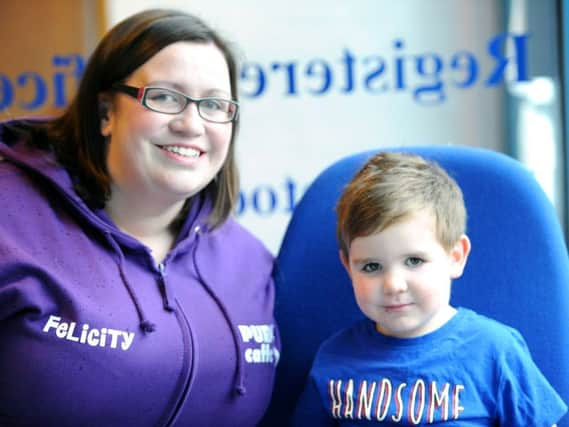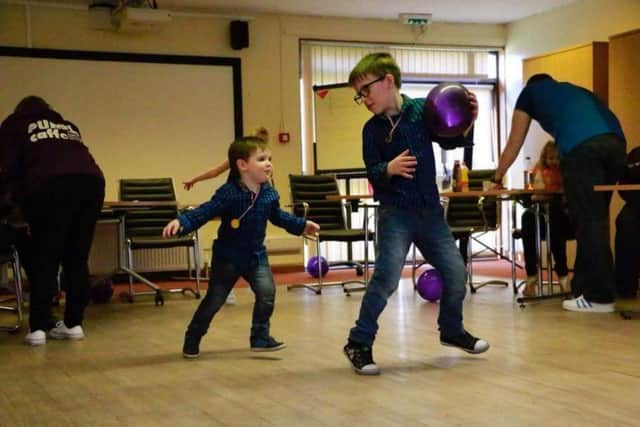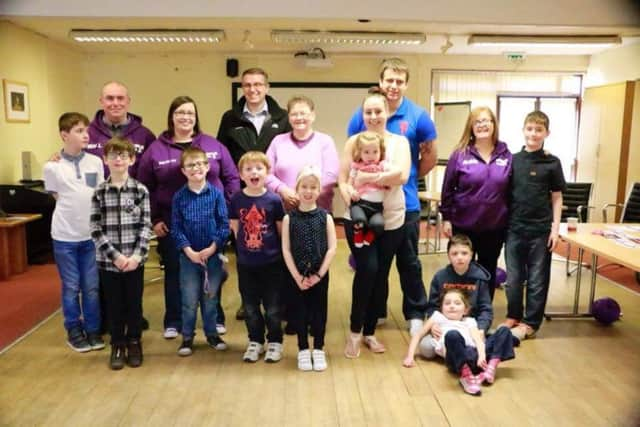Purple Caffe is offering help to Fife families affected by epilepsy


This is more than double the Scottish average, yet, until now, there has been nowhere in the region for them to go to seek help and support.
However, following an information event held recently in the staff club of Kirkcaldy’s Victoria Hospital, this is all set to change.
Advertisement
Hide AdAdvertisement
Hide AdThe Purple Caffe (Children And Families in Fife with Epilepsy) is an informal social support group which is being created to offer help to those families whose lives have been turned upside down by the condition.


Inspired to encourage a positive, informative, and socially inviting outlook on the condition, local families came together to set up a group intended for children and families in Fife living with epilepsy.
And, after a very positive event which attracted five other families plus more interest from some who were unable to attend, the first proper meeting of the Purple Caffe will take place on Tuesday (April 11) again in the staff club at Victoria Hospital from 6pm.
Any family with a member who has epilepsy is invited to pop along for a cuppa, a chat and a chance to share their experiences or vent their frustrations. Children are welcome too.
Advertisement
Hide AdAdvertisement
Hide AdFelicity-Claire Brown (29), from Glenrothes, was only recently diagnosed with a form of epilepsy, years after her eldest child Daniel (7) was diagnosed with focal epilepsy and her younger son Blair (3) had his first seizure aged just 16 weeks.


However, from the outset Felicity decided that her children were going to lead as normal lives as possible and she encourages her sons to do most things that other children their ages do, with Daniel passionate about rugby and Blair a typical adventurous little boy who is into everything.
Felicity explained: “When Daniel was diagnosed we were shocked by how many doors seemed to be closed to him. For example his nursery refused to take him on a trip in case he had a seizure and I had to take him home.
“It was heartbreaking when he asked me ‘Do they not want to play with me because I have epilepsy?’ and that was when I made a promise to him that he would have the same experiences as anyone else, and he does.
Advertisement
Hide AdAdvertisement
Hide Ad“He is rugby daft and he plays for Glenrothes Minis and loves it. His condition doesn’t limit him, although sometimes we have to adapt our daily routine.


“Blair was diagnosed quickly because we knew what we were looking for. He has generalised epilepsy with the seizures that you normally see. It sometimes affects his left side so he has a special buggy to help him on long walks.
“It is just the little things that affect daily life and we have to plan ahead if we are going anywhere, but it doesn’t stop us. We are lucky in that we have reasonably well-controlled epilepsy as some people can’t control it with medication and that is much more difficult.
“We do have a lot of hospital stays and at one point with Daniel we were in every other week both in the Victoria Hospital and the Sick Kids in Edinburgh, but so far this year we have only had the one.”
Advertisement
Hide AdAdvertisement
Hide AdFelicity praised St Paul’s Primary, in Glenrothes, where Daniel’s teacher Mrs Frodshum won a national epilepsy award from the Young Epilepsy group which she nominated her for.


“Since we moved him to St Pauls he is a different child and his confidence has just soared,” she explained.
“She treats him like any other child and that gave him a real boost, so much so that at the awards ceremony he got up on stage in front of hundreds of people to give a speech about her.
“It was also through her that I got the idea for setting up this group and got in touch with other families to see if there was a desire for a local support group.
Advertisement
Hide AdAdvertisement
Hide Ad“In between times I was diagnosed after having a black out in A&E in front of staff who sent me for tests and they discovered that I had epilepsy after more than 20 years of being told it was just attention seeking behaviour and being put in behaviour support.
“That put things on the back burner for a while, but then a nurse put me in touch with Niall Shaw from Kelty who was also interested in setting up a group and together with Dawn Catterson from west Fife things really got moving so now we are up and running and looking at ways of fundraising to take things forward.”
For more details of the event next week see the group’s Facebook page: Purple Caffe Fife and Twitter page: @purplecaffefife.
Epilepsy is not just one condition, but a group of many different ones with one thing in common: a tendency to have seizures that start in the brain.
Advertisement
Hide AdAdvertisement
Hide AdEpilepsy is usually only diagnosed after a person has had more than one seizure and there are 40 different types.
Not all seizures are due to epilepsy. Other conditions that can look like epilepsy include fainting, or very low blood sugar in some people being treated for diabetes.
Anyone can develop epilepsy, at any time of life. It happens in people of all ages, races and social classes. Epilepsy is most commonly diagnosed in children and in people over 65. There are over half a million people with epilepsy in the UK, so around 1 in 100 people.